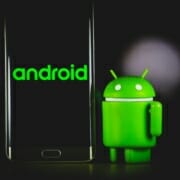Questions About Android App Development? 9 Answers You Need To See
Every appreneur or forward-looking business leader wants to know about Android app development. And that’s because Android dominates the mobile OS market, at a whopping 71% as of November 2022. With such a massive market share, it makes good business sense to push your apps onto this vibrant platform.
And while Android plays a significant role in the mobile market, it’s also a platform that many don’t properly understand. That’s because it’s a platform that will run with Google Play Services or without if a user wants to DeGoogle their phone. In some markets, such as Russia and China, Google services are no longer an option without a VPN.
Furthermore, Android doesn’t only run on mobile devices but also computers, game consoles, IoT devices, TVs, vehicle entertainment systems, and wearables. And since it supports such a wide range of devices, Android comes in various flavors, not dissimilar to the Linux ecosystem. While this is great and a testament to the versatility of Android, it also complicates things.
The hard truth is that Android isn’t locked down like Apple’s iOS platform. So, there’s no simple one-size-fits-all approach here. Not that’s necessarily always the case with iOS, but it’s far less open-ended than Android.
And given Android’s open-ended nature, this presents many challenges and opportunities. Ultimately, this will cause some to ask many crucial questions about Android app development, which we’ll answer in more detail below.
1. When Did Android Debut?
Android 1.0 launched on September 23, 2008, and was made available on the T-mobile G1/HTC Dream phone. Surprisingly, it was feature-rich at such an early stage. It featured Bluetooth, Wi-Fi, a browser, a camera, Gmail, Google Maps, YouTube, and several other applications and features.
2. Is It Similar To Linux?
Android isn’t only similar to Linux but sports a repurposed version of the Linux kernel combined with other open-source components. Google releases Long Term Support (LTS) versions of these kernels under the Android Common Kernels (ACKs) name.
But that doesn’t mean Android apps will run on Linux and vice versa. Users will need a tool such as Anbox, which will set up a container on Linux to run Android apps. And while it’s possible to run certain Linux apps made with Java on Android, it’s a messy process that often requires cross-compilation. Understandably, this isn’t a practical solution for most Android users.
Furthermore, not all Linux app developers will use Java but another programming language instead. So their apps will only run on an Android device via a Linux emulator, but there are no guarantees that they’ll run smoothly, fast enough, or at all. The optimal solution is for these developers to port their apps to Android and take advantage of its touchscreen functionality.
3. Is It Better Than iOS?
No. Only fanboys, platform holders, and some tech publications and journalists play favorites. As an appreneur or business leader, you only need to care about the potential of each platform. In this regard, Android offers a massive user base and a mature ecosystem that has already outpaced iOS. But that doesn’t mean you should ignore iOS, either.
4. What Tools Will I Need For Android App Development?
You will require a recent Windows, macOS, Linux, or Chrome OS computer capable of running the latest version of Android Studio. You will also need at least one test device — preferably running the latest version of the Android OS. While it’s possible to test your app using the Android Emulator (part of the Android SDK), you’ll still want to run it on an actual device.
Furthermore, you should download and install the Android SDK, Android NDK, and Java SE Development Kit (JDK). You can download Android SDK & NDK directly from Google’s Android developer portal and the JDK from Oracle. Read through the documentation thoroughly to configure all of these SDKs properly.
While it’s possible to use other IDEs, Google recommends and officially supports Android Studio. And if you’re planning on developing native Android apps, then it’s best to stick to Android Studio in the long term. Consider using other IDEs, such as Visual Studio, if you’re developing cross-platform apps or mobile games.
5. Which Programming Languages Should I Use?
For native Android app development, choose either Kotlin or Java. But it’s preferable to go with Kotlin since Google officially supports and recommends it for modern app development. However, if you’re a cross-platform developer, you may want to go with C/C++, C#, Dart, JavaScript, or Python.
6. Which Engine Should I Use For Mobile Game Development?
We recommend Unity since it’s the most popular, versatile, and well-supported engine for mobile game development. Also, it’s a good option for 2D & 3D game development, augmented reality (AR), and virtual reality (VR) experiences. But if you require a more heavy-duty engine for creating games with high-fidelity visuals, then you’ll need to go with Unreal Engine.
Either way, you’ll likely use Visual Studio as your IDE or each engine’s visual scripting component. If you want to use Android Studio for game development, you’ll need a game framework instead. One of the best frameworks for native Android game development is libGDX.
7. Will I Need Any Additional Tools For Game Development?
If you’re developing an intensive 3D game, you’ll probably put plenty of stress on the Graphics Processing Unit (GPU). Thus, you’ll need a way to analyze draw calls and monitor your game’s performance frame-by-frame. Luckily, most mobile GPU manufacturers and even ARM offer graphics analyzers and profilers for these purposes.
While it’s possible to ship a mobile game without using these profilers, you risk shipping it with undetected graphical issues. And given that your game needs to run equally well on devices that support different graphics libraries, such as OpenGL ES, OpenCL, EGL, and Vulkan, it’s wise to profile your app before release.
8. Should I Only Focus On Google Play Store?
The beauty of the Android platform is that you have plenty of options besides the Google Play Store. If you’re willing to acquaint yourself with the requirements and Application Programming Interfaces (APIs) of other stores, you’ll find many more avenues to reach new audiences.
After the Google Play Store, you should consider the Amazon Appstore, which runs on Fire OS devices and even on Windows 11. And don’t forget that large smartphone manufacturers such as Samsung and Huawei have their own app stores, and both have sizable audiences.
9. How Do I Get The Most Out Of My Android App?
One of the best things about Android app development is the free tooling that’s available. And one of the best free tools is none other than Google Analytics for Firebase. The Firebase SDK will give you access to a reporting suite that allows you to monitor up to 500 pre-defined events. Moreover, its analytics reports will give you a clear picture of your app’s performance, your marketing endeavors, and user behavior.
In Conclusion
Android app development is worthwhile even though it’s complex and sometimes plagued with difficulties. But it has become easier thanks to the introduction of Kotlin and an ever-improving Android Studio and tooling. Contact NS804 if you have any more questions about Android app development and how we can help you create outstanding apps.












 https://unsplash.com/photos/n31x0hhnzOs
https://unsplash.com/photos/n31x0hhnzOs
Leave a Reply
Want to join the discussion?Feel free to contribute!